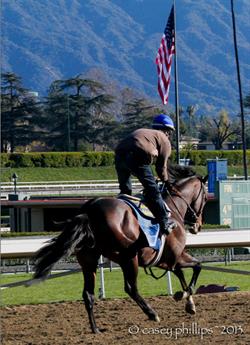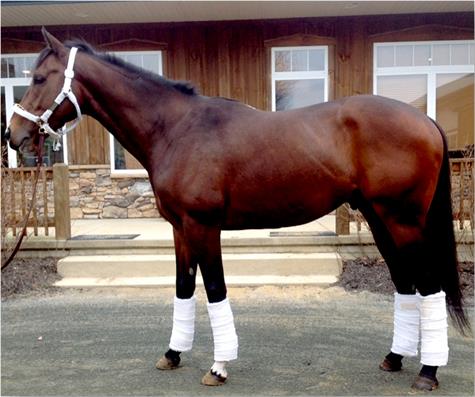Paynter, a lovely dark bay Thoroughbred from the Ahmed Zayat stables, made his name in July 2012, romping home to a decisive victory in the William Hill Haskell Invitational at Monmouth Park. The blood of champions runs through Paynter’s veins – in his pedigree can be found the names of some of the greatest in the history of Thoroughbred racing: Nasrullah, Northern Dancer, Mr. Prospector, and Seattle Slew. Paynter skipped the Kentucky Derby and Preakness prior to finishing a close second to Union Rags in the 2012 Belmont, but his win at Monmouth confirmed his champion genes.
So the news in the fall that Paynter had spiked a high fever and was being treated for colitis and laminitis at Upstate Equine Medical Center was alarming to race fans across the country. Paynter’s primary care veterinarian, Dr. Laura Javsicas, a Penn Vet alumna who is boardcertified in large animal internal medicine, treated him tirelessly for a month. But despite improvement in his condition, he continued to show signs of mild abdominal discomfort and continued to lose weight, despite having a great appetite. Additionally, Paynter had low-grade fevers and a persistently low blood protein concentration, indicating that he was losing protein from his intestine.
 Ultimately, Dr. Javsicas identified what seemed to be an abscess in his colon during an abdominal ultrasonographic examination, which was a wake-up call to seek surgical intervention. Realizing Paynter needed more extensive care, Dr. Javsicas referred him to New Bolton Center.
Ultimately, Dr. Javsicas identified what seemed to be an abscess in his colon during an abdominal ultrasonographic examination, which was a wake-up call to seek surgical intervention. Realizing Paynter needed more extensive care, Dr. Javsicas referred him to New Bolton Center.
Paynter arrived at New Bolton Center late on Monday afternoon, October 1. The list of medications he was receiving to keep him stable was extensive, and he was quite frail as a result of his long-term and serious illness. In short, he was not the powerful athlete he had been only a month before.
New Bolton Center’s seasoned team of critical care specialists reviewed Dr. Javsicas’ description of Paynter’s abdominal problem. Following a complete abdominal ultrasonographic examination by Dr. JoAnn Slack, Assistant Professor of Cardiology and Ultrasound, it was confirmed that the problem area was the tip of the cecum (an essential organ of digestion in the horse). Thankfully, the affected cecum was accessible through a routine abdominal surgical approach.
Paynter quickly endeared himself to the New Bolton Center team. “During his ultrasound examination, he would stand with his head resting in my arms,” recalls Dr. Louise Southwood, Associate Professor of Emergency Medicine and Critical Care, and Paynter’s surgeon. “He enjoyed having his head stroked and would almost fall asleep. It was one of those moments that made you remember why you went to vet school.”
Surgery was scheduled for Wednesday, October 3, to give Paynter a day to recover from his trip from upstate New York. He was anesthetized and positioned on his back. His abdomen was prepared for surgery and draped. A routine approach to the abdomen was made and his cecum was readily identified once the abdomen was open. Surgical staples were used to remove the affected area so that there was no contamination during the procedure. The abdomen was explored to ensure that there were no
other abnormalities – and there were not.
Paynter recovered well from general anesthesia. His progress was monitored 24/7 by New Bolton Center’s skilled, certified nursing staff in the James M. Moran, Jr. Critical Care Center. He was gradually able to resume normal feeding, and all of his medications were sequentially discontinued. When he went to Fair Hill Equine Therapy Center for rehabilitation two weeks after his initial admission to New Bolton Center, he was no longer on any medication and had begun to gain weight.

Before coming to New Bolton Center, Paynter had been diagnosed with mild laminitis. During his hospitalization, Paynter continued to be monitored for the condition. New Bolton Center’s Chief of Farrier Services, Pat Reilly, oversaw Paynter’s foot care. Following Paynter’s discharge to Fair Hill Equine Therapy Center, Reilly visited Paynter regularly until the horse was flown to California.
Paynter has proved to be a remarkable horse. Based on all that New Bolton Center’s highly skilled clinicians identified, there was every reason to believe that he would make a full recovery. At the end of December, after time spent rehabilitating at Fair Hill Training Center, Paynter was shipped to Trainer Bob Baffert’s California barn. The racing public showed its delight at his recovery by voting him the 2012 winner of the Secretariat Vox Populi Award as well as the 2012 National Thoroughbred Racing Association “Moment of the Year.”
As if to endorse the faith placed in him by his devoted owner, Mr. Ahmed Zayat, and the dedicated team of veterinarians and farriers who cared for him, Paynter won his first race on June 14, 2013, just eight-and-a-half months after his surgery. In regards to New Bolton Center, Mr. Zayat commented, “You deserve a lot of credit. And I want to pay my respects to your fine team.”
Paynter’s recovery and successful return to racing is a testament to his owner’s devotion, and to the expertise and dedication of his primary care veterinarian who trained at Penn Vet, and to New Bolton Center’s highly qualified clinicians and outstanding caregivers. His is a real racing success story.